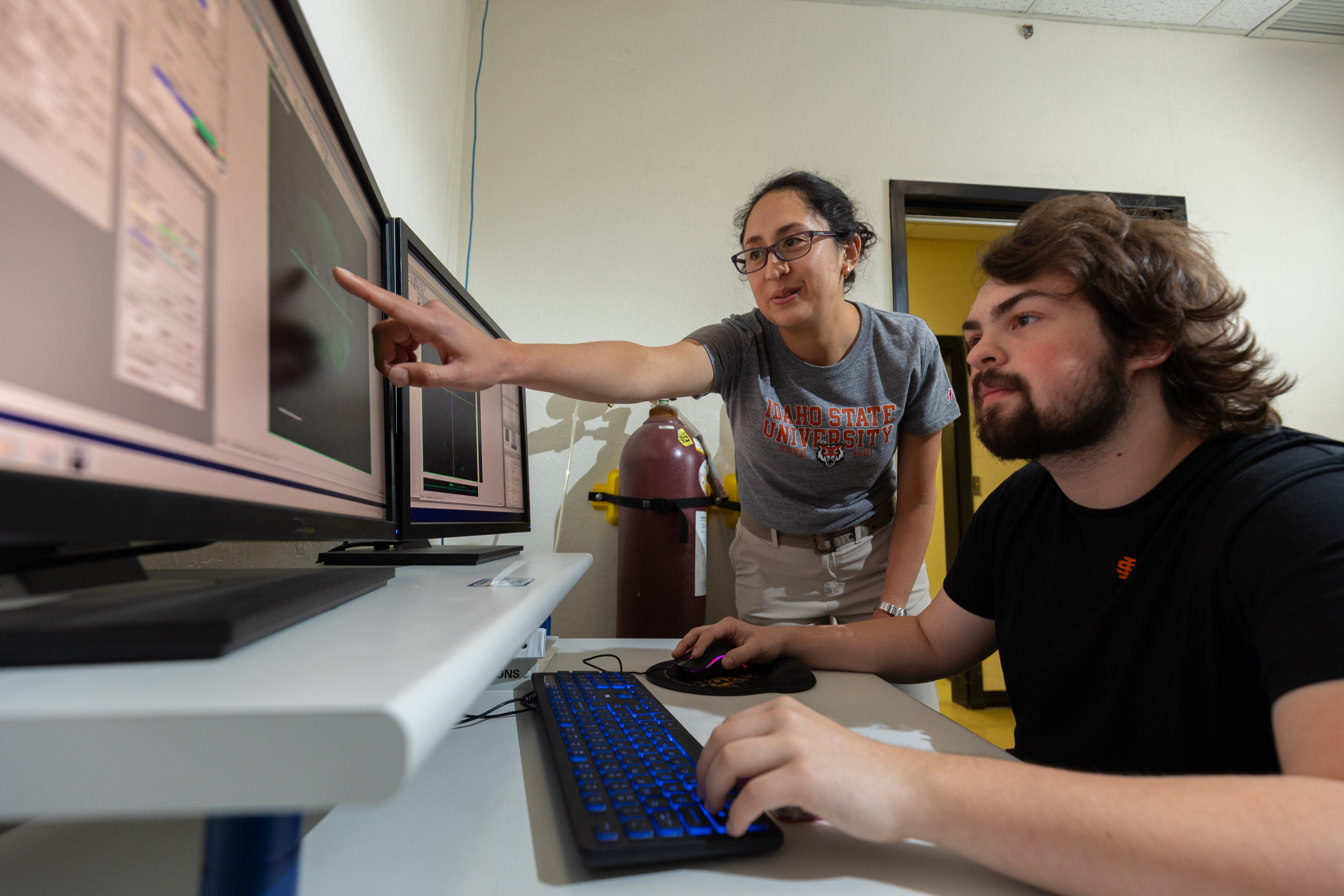ISU Prof.’s Research May Lead to New Treatments for Diabetes, Other Metabolic Diseases
June 20, 2024

How your nerves and metabolism intersect as you age is the focus of a new research project by an Idaho State University professor and her students.
Lizbeth de la Cruz, an assistant professor in the biological sciences department, is an expert on how organisms metabolize glucose—better known as sugar—and aging. In her lab, she focuses on understanding a type of cell in the pancreas called beta cells. These cells, found in specific areas of the pancreas called pancreatic islets, regulate the amount of sugar in the blood.
“Beta cells ensure your glucose levels remain in a healthy state,” said De la Cruz. “Every time you eat a meal, your blood glucose levels rise and the beta cells sense the increase and release insulin, helping glucose enter the cells in your body. Once it’s inside the cells, glucose is used as energy, and the blood glucose levels decrease.”
De la Cruz and her students are asking how aging affects the sympathetic nervous system and insulin release by the beta cells. The sympathetic nervous system controls the pancreas, but it also runs the heart, eyes, intestines, and more.
“The sympathetic nervous system regulates these organs’ function and its activation is linked to responses to stressful situations,” De la Cruz said. “For example, if you find a moose while hiking, your sympathetic nervous system will increase your heart rate and restrict insulin release. Both responses are vital to maintaining the energy –the glucose in your blood– available for your muscles in case you need to run or fight. On a routine basis, the sympathetic nervous system is also active during activities like waking up to an alarm or when you are taking an exam.“
When things go awry in the body, it can cause problems with the sympathetic nervous system. Cancer, chronic stress, infections, and genetic conditions can all strain the system. One of the most common, though, is Type 2 diabetes. More than 38 million Americans of all ages—just over 1 in 10— have diabetes, according to the Centers for Disease Control and Prevention. Nearly 4 out of 10 have prediabetes, meaning they are at risk for developing Type 2 diabetes. The process of aging is also tied back to things being amiss with the sympathetic nervous system.
“Dysfunction of the sympathetic nervous system is associated with an increased risk of the development of cardiovascular and metabolic disorders,” explained De la Cruz. “Aging is also associated with overactivity of the sympathetic nervous system. However, our understanding of the mechanisms behind sympathetic nervous system dysfunction during disease and aging is limited.”
Back to the beta cells in the pancreas, De la Cruz and her students will analyze how beta cells in young, middle-aged, and older mice respond to activation of the sympathetic nervous system. They will be measuring the electrical signals produced by beta cells as well as the amount of calcium in the cells before, during, and after activation.
“Our goal is to determine whether aged beta cells respond at all, and, if so, whether the response is similar to the one observed in cells from young animals,” de la Cruz said.
“Working on this project has allowed me to realize my goals of working in research,” said Danny Whisman, a senior majoring in microbiology. “I love the research aspect of science and have been wanting to involve myself in research for many years. Working with Dr. De la Cruz has been a great experience so far, as she is always very knowledgeable and kind, helping guide us to make the most educated decisions possible.”
Using specialized microscopes, the researchers will also look at how aging affects the pancreatic islets.
“We will be measuring how amount, shape, and distribution of nerves and receptors in the pancreatic islets,” De la Cruz said.
The Idaho IDeA Network of Biomedical Research Excellence (INBRE) Program is funding De la Cruz's research through a Pilot Project grant. In 2023, de la Cruz’s colleagues Kinta Serve, associate professor, and Heather Ray, assistant professor also received a Pilot Project grant through INBRE.
“The research we are doing here not only gives me the skills that I need for my future endeavors but is incredibly important in our community,” said Brooke Wheeler, a senior majoring in microbiology. “Understanding how beta cells respond to the aging process is vital in not only comprehending the disease but preventing it. Although our work is in the early stages, we have been able to do some data analysis and been able to draw some exciting conclusions.”
“Our research is creating a foundation for understanding how aging affects the sympathetic nervous system and its impact on the body’s ability to release insulin,” De la Cruz said. “The knowledge we gain may help in developing new treatments for metabolic diseases like Type 2 diabetes that target the sympathetic nervous system, similar to what we’ve seen in new treatments for diseases like hypertension.”
Learn more about ISU’s Department of Biological Sciences at isu.edu/biology.
To schedule a campus tour, visit isu.edu/visit.
Categories:
